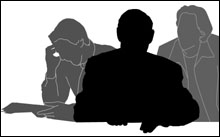
OUT OF THE SHADOWS: Once toiling in thankless obscurity, the news ombudsman is beginning to play a bigger role in American journalism. |
Eleven years ago, after working only a few months as the Boston Globe ombudsman, I attended my First news ombudsmen convention in Fort Worth, Texas. While I was still relatively bright-eyed and bushy-tailed, I did notice that several of my colleagues who had spent years in ombudsmanship had something of a worn, world-weary look about them.One of them pulled me aside, and, noticing my rookie enthusiasm for the job, asked if I thought that the Globe readers who were contacting my office to comment/complain about the paper generally seemed to be full of good-old grassroots wisdom and common sense. When I answered in the affirmative, he shook his head sadly and warned me that in a year, I’d be slamming the phone down and cursing said callers.
There was a certainty in his voice.
Part internal-affairs cop, part complaint department, American news ombudsmen are truly a unique breed. They work in what has often been considered one of journalism’s most thankless jobs: getting an earful from angry (and sometimes crazed) readers and getting the cold shoulder from angry (and sometimes crazed) colleagues whom they dared to criticize, usually gently, in their columns. In addition, ombudsmen frequently toil in the shadow of public suspicion since they are paid by the same news outlets they are charged with independently evaluating.
For the record, I was the Globe ombudsman for a little more than two years, from 1995 to 1997. It’s fair to say that being an ombudsman or public editor or readers’ representative is not for everyone.
In his new book, Public Editor #1, Dan Okrent recounts his career as the first ombudsman (or, as they call it, “public editor”) at the New York Times. His introductory chapter is titled “Notes On An Unendearing Profession” in which he recounts a telling anecdote about his introductory meeting with Times publisher Arthur Sulzberger Jr.
What was the first question Sulzberger asked of the first person to be paid solely to publicly evaluate the paper’s performance?
“Why on earth would you want to do this?”
Last month, after a little less than a year on the job, Globe ombudsman Richard Chacón — a good guy who saw the job as a chance to create better dialogue between the paper’s journalists and its readers — abruptly left the post to become communications director for Democratic gubernatorial candidate Deval Patrick, a gig that might not last past primary day. Although he didn’t say so, it’s fair to assume that Chacón was less than enthralled by some of the less pleasant chores of the ombudsman’s office.
Even the acronym for the umbrella group — the Organization of News Ombudsmen — is the rather lamentable “ONO,” which, let’s face it, is an exclamation usually uttered when someone acknowledges a terrible mistake (or a noun referring to the destructive force behind the break-up of the world’s greatest band).